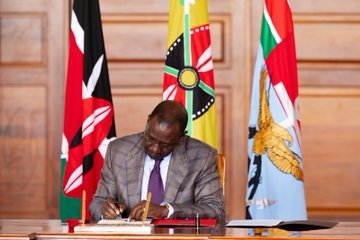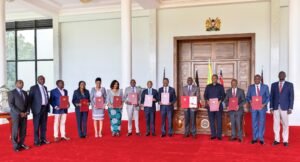
President William Ruto signed the Appropriation Bill 2024 at the State House on Friday, just two days after declining to sign the Finance Bill, 2024 into law.
His move comes amidst national reactions and street protests reflecting the gravity of the bill which was termed punitive.
On Wednesday, 26th June 2024, President Ruto sent a memorandum to the National Assembly, rejecting all clauses of the Finance Bill 2024.
This move was fueled by the need to address the concerns raised by millions of Kenyans and ensure financial prudence in government operations.
Articles 221 and 222 of the Constitution mandate the assent of the Appropriations Bill by the 30th of June each year to ensure the continuity of essential government services.
By signing the Appropriations Bill 2024, President Ruto stressed the critical nature of the legislation in upholding governance obligations.
What the Law Says About Appropriation Bill
Article 221 of the Constitution of Kenya states iin part that;
“When the estimates of national government expenditure, and the estimates of expenditure for the Judiciary and Parliament have been approved by the National Assembly, they shall be included in an Appropriation Bill, which shall be introduced into the National Assembly to authorise the withdrawal from the Consolidated Fund of the money needed for the expenditure, and for the appropriation of that money for the purposes mentioned in the Bill.”
Also Read: Kenya Shilling Weakens Against Dollar as President Ruto Rescinds Finance Bill, 2024
However, the Appropriation Bill in the above-quoted clause shall not include expenditures charged on the Consolidated Fund by this Constitution or an Act of Parliament.
Supplementary Budget Estimates
On Friday still, President Ruto instructed the National Treasury to promptly prepare supplementary estimates to cut expenditure by the revenue projected from the rejected Finance Bill 2024.
The revenues which had been targeted in the Bill equals Ksh.346 billion.
This reduction will be shared equitably between the National and County Governments, signifying a severe budget dent in all governmental branches and agencies.
President Ruto also referred the County Allocation and Revenue Bill, tied to the rejected Finance Bill revenues, back to Parliament for necessary amendments.
He also tasked the National Treasury with presenting adjustments to the Division of Revenue Act 2024 to align with the reduced revenues stemming from the rejected bill.
To ensure fiscal responsibility and prioritize essential services, President Ruto directed accounting officers to allocate no more than 15% of the budget for critical services until the supplementary budget receives approval.
This austerity measure aims to streamline government spending and mitigate the repercussions of the rejected Finance Bill.






